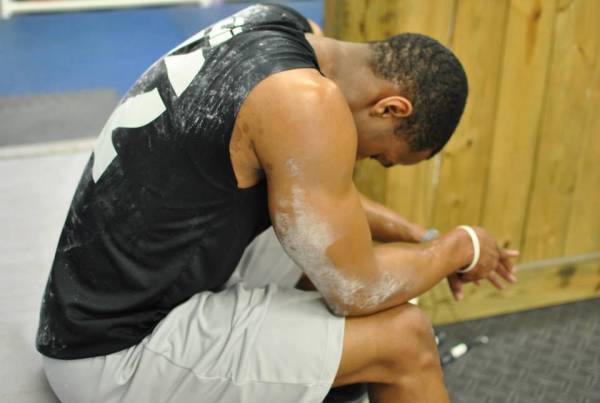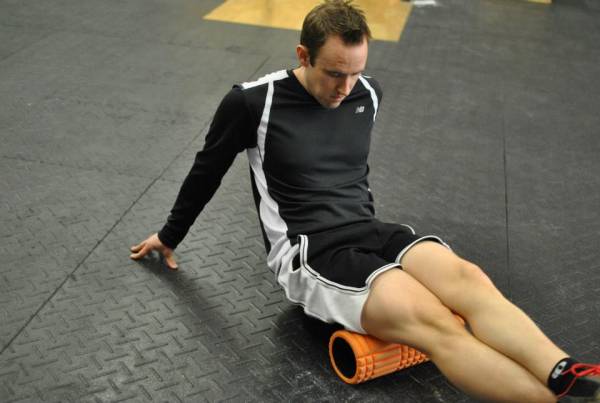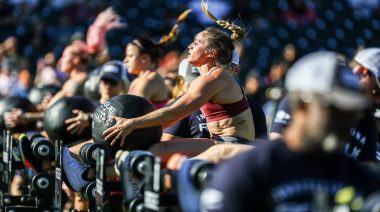So you have been doing CrossFit for some time now, and you have made noticeable gains in your fitness. That is great! Now, you should take some time to stop what you are doing and reflect on how incredible it is that you are improving your body’s health and capabilities. Getting your first chin up, muscle up, or handstand push up is an accomplishment worth celebrating.
But as you continue to progress in CrossFit, you might reach a point where you find yourself pushing harder and harder to get extra reps and rounds to the detriment of your form and technique. This is not the way to go. If the quantity of reps you perform only increases by sacrificing the quality of said reps, then your body is likely to reach a plateau, or worse, incur an injury.
Rather, you should prioritize quality over quantity so that in the future you may continue to make gains in strength, work capacity, mobility, and overall fitness. Here are some practical tips for how to do that in a CrossFit setting.
1. Breathe
What a simple thing that we all do everyday. However, mid-WOD, it suddenly becomes apparent that you have not been breathing adequately. How about this: focus on inhaling. Long, slow, controlled, and in through the nose.
If you are doing a twenty-minute AMRAP, then I want you exclusively breathing through the nose for at least the first ten minutes. Heavy mouth breathing should be reserved for sprints, short efforts, and the ends of workouts. While you initially might need to slow down in order to breathe through your nose, in the long run your body will experience positive aerobic adaptations.
2. Break Up Sets
Have you ever stopped and thought about why 21-15-9 is such an effective rep scheme? One reason is because each set can be broken up into three distinct sub-sets: 3 sets of 7, 3 sets of 5, and 3 sets of 3. Another great way to break up this rep scheme is: 11 and 10, 8 and 7, then 5 and 4. So the next time you do “Fran,” “Diane,” or “Elizabeth,” strategize a bit beforehand and see if that helps you set a new personal record.
Another way to state this is that you should not push yourself to failure every round of every workout. Rather, choose a sub-maximal number of reps that you are confident you can complete, and aim to keep yourself just shy of the danger zone for the majority of your workouts.

3. Rest Between Sets
Rest?! Are you not supposed to go all out as fast as you can? Okay, yes, I get it – the workouts are done for time. But you might end up with an overall faster time (and thus greater work capacity) if you actually plan to rest between sets from the get-go.
For instance, next time you do “Cindy” (AMRAP in 20 minutes of 5 pull ups, 10 push ups, and 15 squats), try to do one round at the top of every minute. If you succeed, you will have accumulated twenty rounds. It will feel very easy in the beginning and very not-so-easy at the end.
If twenty rounds of Cindy is out of your reach, then try one round every ninety seconds. Or, vice-versa, if your old personal record is higher than twenty trounds, try one round every 45 seconds or so.
4. Prioritize Mobility
You know you are supposed to do it, but somehow you only manage to hit the foam roller or grab that stretch band once or twice a week. How about this: you are not allowed to do a WOD unless you have first done your mobility work for the day.
Have you ever set a timer for five minutes and then rolled out your thoracic spine? Or what about grabbing a lacrosse ball and hitting your entire shoulder girdle? Check out Kelly Starrett’s awesome MobilityWOD for more ideas.

5. Scale Movements and Weights Efectively
If you only take one principle away from this post, please pay attention here. You want to make optimal choices in your life, correct? If you could take two routes to your destination, but one of them was longer and riskier, what would you decide? You would take the optimal route. Duh!
Similarly, learning to scale movements and weights effectively is how you optimize CrossFit workouts to fit your individual fitness level and needs. Refer to Prilepin’s Chart (a guideline for what percentage of your 1RM to lift for each given rep range) when choosing what weights to do for WODs. Hint: it might be lighter than you think!

![]() Click To Tweet: How to determine the ideal weight to use in a CrossFit WOD
Click To Tweet: How to determine the ideal weight to use in a CrossFit WOD
6. Take Individual Accountability
How can you reach your own goals when someone else is planning the workouts for you? This is when you need to take individual accountability for your own CrossFit practice. If the WOD has back squats for strength, but your goal is a double-bodyweight deadlift, then explain to your trainer that you are focusing on the deadlift that cycle.
Similarly, if you want to get your first strict chin up, then reduce the reps of banded chin ups, kipping pull ups, or ring rows in the WOD and do a few super-slow negatives each round instead. It might be different than what is written on the whiteboard, but I am willing to bet that you (and your goals) might be a little different than everyone else in the class around you, as well.
If you have any additional practical tips for how to prioritize quality over quantity in a CrossFit setting, please post to the comments below.
Photos courtesy of CrossFit Impulse.






